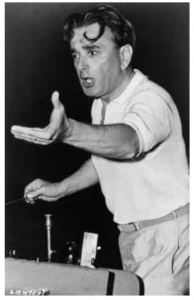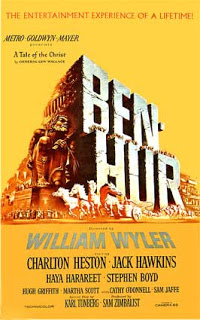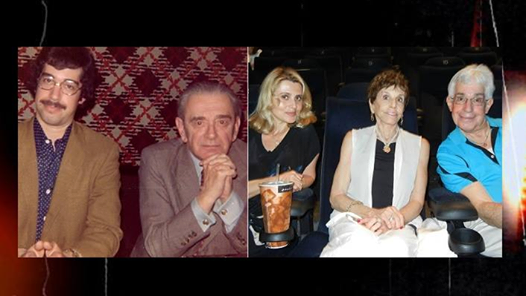By Steve Vertlieb: Miklos Rozsa remains among the most revered composers in film history. The three-time Oscar winner for Best Original Score For A Motion Picture was a pioneering musician who, along with Bernard Herrmann, Alfred Newman, Max Steiner, Erich Wolfgang Korngold, Franz Waxman, Dimitri Tiomkin, and Victor Young brought dramatic, melodic musical form and structure to the sound of film, thereby forever altering the way we listen to movies. Elmer Bernstein considered both Miklos Rozsa and Bernard Herrmann the finest practitioners of the developing art form of Music For The Movies in the remarkable history of the medium.
 In a career that comprised some forty-five years of scoring and achievement, Miklos Rozsa created lush, romantic scoring for such beloved fantasy films as Alexander Korda’s The Thief of Bagdad, and the tale of a young Wolf Boy named Mowgli for The Jungle Book. He became the defining voice of classic Film Noir with such scores as Double Indemnity, Brute Force, The Killers, The Naked City, and The Lost Weekend for director Billy Wilder and, as the 1950s approached, virtually invented the epic motion picture score for such films as Quo Vadis, Ivanhoe, Knights of the Round Table, Ben Hur, King of Kings, and El Cid. He was a musical chameleon who reinvented both himself and the remarkably diverse genres for which he composed Time After Time. Here, then, is this published career retrospective and tribute to a consummate artist whose Lust For Life elevated the craft and power of Cinema to sublime ascension.
In a career that comprised some forty-five years of scoring and achievement, Miklos Rozsa created lush, romantic scoring for such beloved fantasy films as Alexander Korda’s The Thief of Bagdad, and the tale of a young Wolf Boy named Mowgli for The Jungle Book. He became the defining voice of classic Film Noir with such scores as Double Indemnity, Brute Force, The Killers, The Naked City, and The Lost Weekend for director Billy Wilder and, as the 1950s approached, virtually invented the epic motion picture score for such films as Quo Vadis, Ivanhoe, Knights of the Round Table, Ben Hur, King of Kings, and El Cid. He was a musical chameleon who reinvented both himself and the remarkably diverse genres for which he composed Time After Time. Here, then, is this published career retrospective and tribute to a consummate artist whose Lust For Life elevated the craft and power of Cinema to sublime ascension.
In sweet, joyous celebration of a cherished relationship with one of the most remarkable musicians and artists of the twentieth century, here is a loving remembrance of my twenty-seven-year friendship with three-time Oscar-winning composer Miklos Rozsa, as well as an affectionate recollection of coming of cinematic age and maturity during the comparative innocence of the nineteen fifties. Miklos Rozsa remains one of the most revered and legendary motion picture composers in screen history, and it was my sublime honor and privilege to know him for nearly three decades. Born April 18th, 1907, we remember and commemorate the monumental influence of this superlative artist and man.
- Excerpt from Maestro Miklós Rózsa & Family: “The Stuff Dreams Are Made Of” – A Reminiscence by Steve Vertlieb
Humphrey Bogart uttered one of the most famous lines in movie history when he held The Maltese Falcon in his hands and mused wistfully … “The stuff that dreams are…”
 In 2007 I was asked by the folks who ran the venerable Castro Theater in San Francisco to put together a Miklos Rozsa film festival for their historic venue. I chose seventeen films to reflect a variety of moods expressed on screen by the wondrously gifted composer. The film festival ran for nine days toward the end of December, 2007, and into January, 2008. I wrote the notes for the official program handed out for the once in a lifetime event, and hosted a thirty-minute interview “live” on stage with Juliet Rozsa, daughter of this illustrious composer, before a paying crowd of some seven hundred movie goers prior to a presentation of the composer’s masterpiece, Ben-Hur, on the giant Castro screen. Proclamations, tributes, and testimonials were written for the occasion by the Hungarian Ambassador To The United States, The Honorable Mayor of San Francisco, and legendary writer Ray Bradbury.
In 2007 I was asked by the folks who ran the venerable Castro Theater in San Francisco to put together a Miklos Rozsa film festival for their historic venue. I chose seventeen films to reflect a variety of moods expressed on screen by the wondrously gifted composer. The film festival ran for nine days toward the end of December, 2007, and into January, 2008. I wrote the notes for the official program handed out for the once in a lifetime event, and hosted a thirty-minute interview “live” on stage with Juliet Rozsa, daughter of this illustrious composer, before a paying crowd of some seven hundred movie goers prior to a presentation of the composer’s masterpiece, Ben-Hur, on the giant Castro screen. Proclamations, tributes, and testimonials were written for the occasion by the Hungarian Ambassador To The United States, The Honorable Mayor of San Francisco, and legendary writer Ray Bradbury.
 Here is a first person report by Michael Guillen, an independent film journalist sitting among the capacity crowd during that memorable evening: The Evening Class: MIKLÓS RÓZSA—An Onstage Tribute.
Here is a first person report by Michael Guillen, an independent film journalist sitting among the capacity crowd during that memorable evening: The Evening Class: MIKLÓS RÓZSA—An Onstage Tribute.
Vertlieb read Bradbury’s tribute to the Castro audience and the Rózsa family members on stage: “In all my life I’ve never had a more complete relationship with a composer than with Miklós Rózsa. When MGM asked me to write the narration for King of Kings, I immediately joined a partnership with Margaret Booth, the film editor, and we became fast friends. The most wonderful moment in my life was when I went on the sound stage to watch Miklós Rózsa conduct the score for King of Kings and then heard my own voice booming out over the orchestra and dear Miklós’ head as I spoke the narration. I wish that I had a recording today of my voice with his music because it became a partnership and a great friendship for life. To everyone hearing his wonderful music this week, I send my love and regard to the memory of Miklós Rózsa.”
++ Steve Vertlieb, 2018
Discover more from File 770
Subscribe to get the latest posts sent to your email.

I prefer the style of film composing that reflects the Late Romantic to Early 20th Century styles of formal music (including Jazz). Melodies and motifs that are memorable long after the film is over.
I don’t understand that the current Hans Zimmer style of composition. It all sounds like video game music. No beginning and no end all meant to loop if you can’t get through the level in a set amount of time.
Steve: Thanks for this, especially your biographical essay on Rosza which had a lot of information new to me. I love Rosza’s work, particularly EL CID and BEN-HUR, and his Violin Concerto is great too. His scores have given me a great deal of pleasure.
No mention of “The Power” ? His use of the mazourka was a highlight of the score.
Rozsa was a very fine composer. All of his concertos are superb, though my favorite is probably the Sinfonia Concertante, and his string quartets are excellent as well. He did a series of solo sonatas that I like a lot. This is another of my favorite pieces of his: